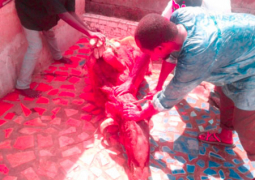What gripped those women early that Sunday morning as they went to 'anoint Jesus' body', their beloved Master - though carefully recorded in the Gospels - is not as simple and straightforward as it seems. On that particular morning, as the facts gradually unfolded, multiple emotions of shock, fear, deception and sadness rocked their beings in the face of an empty tomb.
Different questions must have crossed their minds: questions to which they could not have had immediate answers. One thing is certain though; they must have been completely dumbfounded. What could have happened to his body? Who could have done this wicked thing? Where have they taken him? Not one single puzzle could have fallen in place however hard they would have exercised their minds.
Bewildered and in utter desperation, they must have been just about giving up when things begin to take shape and a glimmer of light pierced the darkness around them.
As they were approaching the tomb where his body was laid, they had been asking themselves: "Who will roll the stone away from the entrance of the tomb?" (Mark 16:3) Their frailty as women against that huge stone must have been upsetting something that would have been an uphill task and a definite hurdle. But they found the stone had already been rolled away as if in answer to their prayers.
They had entered the tomb nevertheless amidst doubts. Then they had their first encounter: "They saw a young man dressed in a white robe sitting on the right side, and they were alarmed." (Mark 16: 5) Shock at the open tomb which was empty, then face to face with a stranger who assured them: "Don't be alarmed, you are looking for Jesus the Nazarene, who was crucified.
He has risen! He is not here. See the place where they had laid him." (Mark 16:6) Did they hear right? Even if they did, they could not have made head or tail of it all.
The young man added: "But go, tell his disciples and Peter, 'He is going ahead of you into Galilee. There you will see him, just as he had told you.' " (Mark 16:7) Mark described the scene in these terms: "Trembling and bewildered, the women went out and fled from the tomb. They said nothing to anyone, because they were afraid." (Mark 16:8) Wouldn?t you have been?
Some events in our lifetime surpass our understanding. We haven't a vague notion why they occur and why they happen to us. In these particular circumstances, they had simply come to perform a ritual in honour of a loved-one and were greeted by an empty tomb but in addition to this fact they received a declaration of Jesus' resurrection.
They left the scene with mixed feelings - afraid because the experience was awesome; happy because they were going to break the news to the apostles. "So the women hurried away from the tomb, afraid yet filled with joy, and ran to tell his disciples." (Matthew 28:8)
Surprisingly, all of this happened in a short space of time. How much of this were they able to fully absorb? They came to the tomb with some apprehensions; with broken hopes that the Christ in whom they had put all their trust had been crucified.
They had been overtaken by sadness having been deeply grieved at what seemed an abrupt end and a premature death amidst stark cruelty perpetrated by the Jewish and Roman authorities.
It was a great relief therefore that they had received assurance that after all there was reason to rejoice.
It is recorded in the Gospel of Luke that: "In their fright the women bowed down their faces to the ground (when two men in clothes that gleamed like lightening spoke to them) ?Why do you look for the living among the dead? He is not here; he is risen! Remember as he told you, while he was still with you in Galilee: The Son of Man must be delivered into the hands of sinful men, be crucified and on the third day be raised again." (Luke 24:6-7) Their memory was pricked and things became clear in their minds once again.
The joy that seized the women at the announcement of Jesus' resurrection demonstrating his victory over death on that Sunday morning is what we as Christians celebrate at Easter. It is a unique kind of joy that dispels any emotions of fear and discouragement that have overcome us. It is the demonstration of where we put our faith henceforth.
The power that rolled the stone and raised Jesus from the dead we believe will invade our lives and rekindle them for life everlasting.
The Christian need no longer live in fear as if this life has no hope. Because Christ has conquered death we too are assured of eternal life. Because he lives we shall live also even though we die. Death for the Christian is not an end in itself, but the beginning of a new life in the heavenly realm.
To experience this joy, look to the resurrection experience of our Lord Jesus and claim what it holds for you. People still doubt whether really Christ prevailed over death: well, his own disciples doubted at first also.
"They did not believe the women because their words seemed to them like nonsense." (Luke 24:11) But when they got to the tomb, John "saw the strips of linen lying there as well as the burial cloth that had been around Jesus' head.
The cloth was folded up by itself, separate from the linen. He saw and believed." (John 20:7-8) To Thomas one of the disciples who also had been sceptical Jesus said: "Put your finger here; see my hands. Reach out your hand and put it into my side. Stop doubting and believe." (John 20:27) This must have put an end to the doubting just as I suppose it has done to yours.
Thomas then responded: "My Lord and my God!" It is an affirmation of what Jesus then meant to him. You may not have to go through that process yourself. However here is how Jesus summed up Thomas' reaction.
"Because you have seen me, you have believed; blessed are those who have not seen, and yet have believed." (John 20:29) Would you count yourself as one of those? Then blessed are you!
Read Other Articles In Article (Archive)
Coach Nyassi Impasse With Financial Straitened
Jun 5, 2009, 9:12 AM




